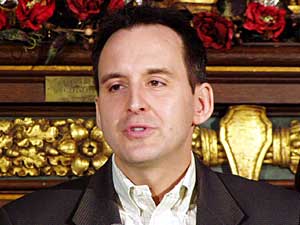Audio
Photos
More from MPR
Resources
Your Voice
| ||||||||||||||||||||||||||||||||||||||||||||||||||||||||||
Pawlenty announces new education initiatives
January 5, 2004
 |
| Gov. Pawlenty announced an ambitious list of education reforms he wants the Legislature to consider next month. "Minnesota schools need innovation," he says. (MPR Photo/Tim Pugmire) |
St. Paul, Minn. — Gov. Pawlenty says Minnesota has a proud history of education innovation. But he says it's been too long since the state led the nation in such school reforms as open enrollment and charter schools. Pawlenty added seven more education proposals to the list he began last fall. He says even with limited state budget resources it's time to try a lot of new ideas.
"I want to regain the mantle of being a state that is about education innovation," he said. "Let's try everything. Let's try anything that crosses a plausible threshold of credibility and promise. Let's try it. Now we shouldn't try it all statewide all overnight, but let's take 15, 20, 30 things and try them in demonstration projects. And if it works, let's run with it."
The governor's previous announcements focused on getting students reading by the end of first grade, taking away driver's licenses from chronically truant students, and creating a bonus pay program to help struggling schools attract the top educators.
 | |||
His latest proposals include efforts to encourage more charter schools. Pawlenty wants to loosen some of the state's current restrictions on charter school sponsorship. He also wants to create a recognition program for students who score high on state tests and encourage school districts to explore ways to share administrative expenses. A proposed $4.5 million grant program would help offset the high cost of high-speed Internet access in some rural school districts.
The governor also wants to set rules for restructuring low performing school districts. The federal No Child Left Behind Law requires states to take corrective action in persistently failing schools and school districts. Pawlenty says the action could go as far as abolishing a district.
"If we have repeated performance stagnation or failure at a school site or a school district, there's only so long you can look the other way and hope it changes before more dramatic measures have to be installed," Pawlenty said.
Rep. Mindy Greiling, DFL-Roseville, a member of the House Education Policy Committee, was quick to criticize the restructuring proposal, calling it "a death sentence for urban schools." She claims the Republican governor is setting the stage for a more controversial reform: private school vouchers.
"Clearly the governor is heading for vouchers with this plan. That's always been his goal is to starve the public schools and then reconstitute them. And the next step will be vouchers. I've always been convinced of that, and listening to this press conference today just reinforces my suspicions," Greiling said.
A spokeswoman for Gov. Pawlenty denied Greiling's allegations, saying the proposal has nothing to do with vouchers, and added there are no plans to look at that issue.
Sen. Steve Kelley, DFL-Hopkins, chairman of the Senate Education Committee, claims the governor's education agenda won't bring any systemwide improvements because it's limited to small pilot projects. He also says these proposals have been around awhile.
"They've been pitched as being innovative and bold, and for the most part they are rehashing old ideas that have been discussed before. It's good that governor is now on board, but to describe them as new or innovative I think is a stretch," Kelley said.
The governor's announcement was the fourth part of an education agenda he calls "Excellence and Accountability." Other proposals in this installment include a focus on teacher recruitment in rural schools and the creation of a leadership academies where business leaders would teach management skills to school personnel.
It's a lot for lawmakers to tackle in a short session. But Rep. Alice Seagren, R-Bloomington, chairwoman of the House K-12 Finance Committee, says she's ready to get to work.
"I'm very, very anxious for the debate and the discussion, because I think some of the things that the governor has rolled out are real positive things. They're positive in the sense that they're helping kids learn. And they're trying to solve some problems educationally that we've been grappling with for a long time, and he's proposing some ways and solutions to do this," Seagren said.
Seagren says her committee can address 99 percent of the governor's education agenda. The 2004 Legislative session begins Feb. 2.
|
News Headlines
|
Related Subjects
|

